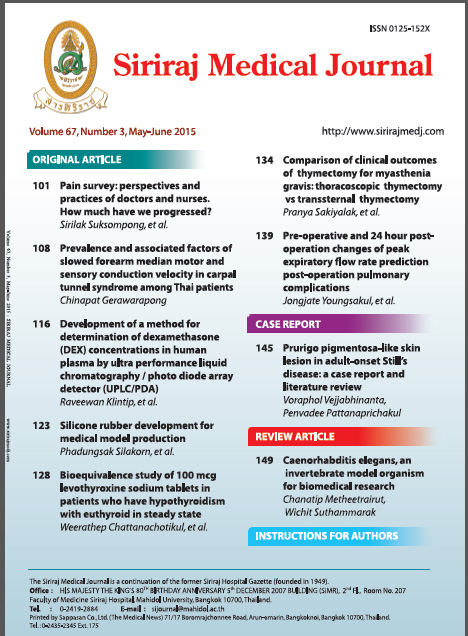Bioequivalence Study of 100 mcg Levothyroxine Sodium Tablets in Patients Who Have Hypothyroidism with Euthyroid in Steady State
Abstract
Objective: The purpose of this study was to ascertain the bioequivalence between a test product (100 mcg levothyroxine sodium tablets; Thyrosit, SRIPRASIT PHARMA Co., Ltd., Thailand) and the reference product (100 mcg anhydrous thyroxine sodium; Eltroxin, GlaxoSmithKline).
Methods: An open-label, 2-treatment, 2-period, 2-sequence, randomized crossover design without washout period was studied in 16 patients (8 females in group 1, 1 male and 7 females in group 2) who were diagnosed hypothyroidism with euthyroid in steady state. The enrolled subjects were given a tablet of 100 mcg levothyroxine sodium either the test or reference product daily for 57 days of each period. At steady state (Day 57 on period 1 and Day 114 on period 2), blood samples were collected over a 24-h interval and the concentrations of T4 were examined by a Microparticle Enzyme Immunoassay technique. Pharmacokinetic parameters were evaluated from plasma concentration-time profiles of T4 using the non-compartmental analysis without the adjustment of baseline levels.
Results: The 90% confidence interval of geometric mean ratio of primary target parameters(Cssmax and AUC0-24(ss)) between the test and reference formulations was entirely within the bioequivalence acceptance limits of 80.00-125.00%, which was 103.32% (97.99-108.93%) for Cssmax ratios, and 102.32% (96.97-107.96%) for AUC0-24(ss) ratios, together with the power more than 80%. In addition, the nonparametric Friedman’stest for Tssmax demonstrated no significant difference between the two formulations (p>0.05). All subjects tolerated their medication well. No serious adverse effect was observed.
Conclusion: The test and reference products of thyroxine in this study are bioequivalent and well tolerated.
Keywords: Levothyroxine, hypothyroidism, bioequivalence
Downloads
Published
How to Cite
Issue
Section
License
Authors who publish with this journal agree to the following conditions:
Copyright Transfer
In submitting a manuscript, the authors acknowledge that the work will become the copyrighted property of Siriraj Medical Journal upon publication.
License
Articles are licensed under a Creative Commons Attribution-NonCommercial-NoDerivatives 4.0 International License (CC BY-NC-ND 4.0). This license allows for the sharing of the work for non-commercial purposes with proper attribution to the authors and the journal. However, it does not permit modifications or the creation of derivative works.
Sharing and Access
Authors are encouraged to share their article on their personal or institutional websites and through other non-commercial platforms. Doing so can increase readership and citations.










